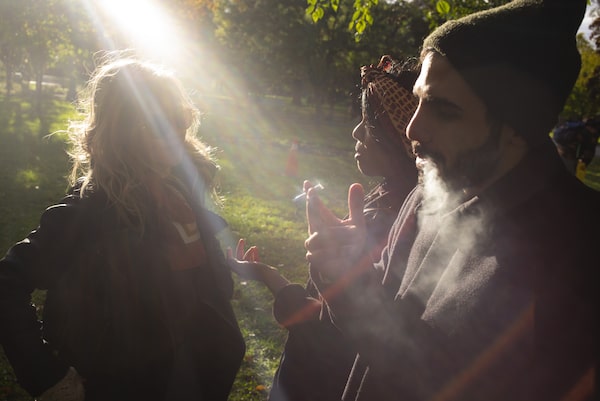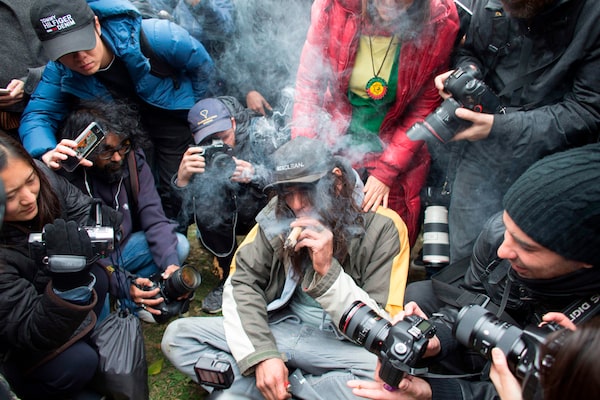
Cannabis users congregate in Toronto's Trinity Bellwoods Park for a 'smoke out' on Oct. 17, 2018. Canada became the second country in the world after Uruguay and the first Group of Seven country to legalize cannabis use on Wednesday.Ian Willms/Getty Images
Admittedly, Day 1 of legalized cannabis in Canada started slowly.
No one in line at the Starbucks at the corner of Bloor Street and Howland Avenue in downtown Toronto was high at 9 a.m., by their own admission, even on this, the first day of legalized cannabis in the true north, strong and weed. Then the third guy in line, the big guy, the guy who was getting impatient because the baristas were so slow, said to ask again at noon when the high-school kids come in.
Neither of the barbers across the street at Gus the Other Barber – by now it was 9:30 – were high. “We have one guy who does it recreationally,” one of the barbers said, “and he’s been asked [if he cuts hair] while he was high, but he won’t do it, he says, because, you know, we work with razors.”
The illegal, but excellent, dispensary three blocks south of the barber shop was open, despite warnings from Ontario Premier Doug Ford that dispensaries have to close now if they ever want to operate legally. The manager said she was caffeinated, but not high because it was too early. She found the big day exciting but sombre, remembering all the people whose lives were affected by the struggle for legalization.
Cannabis was illegal in Canada for nearly a century. Using it has been frowned upon for even longer. If Day 1 of legal recreational cannabis is any evidence, the stigma that survives will determine whether cannabis becomes an accepted habit of mainstream life for anyone but the people who already use it.
The first day of legalized weed seemed to be holding its powder. A huge smoke-in was planned for 4:20 p.m. at Trinity Bellwoods Park in the west end. The ultra-hip Drake Hotel was hosting a fête that night for cannabis pioneers; there were rumours of secret guests. The Entrepreneurship Society was hosting “Canada’s largest premier Legalization Party” – described in a news release as a “600+ professionals ‘dress to impress’ legalization party” – at the Love Child Social House. That sounded unusual.

A man smokes a joint at a legalization party in the park on Wednesday.GEOFF ROBINS/AFP/Getty Images
Leafly, the cannabis information hub owned by Privateer Holdings, which also owns Tilray Inc., a much-vaunted licensed producer in Nanaimo, B.C., had beaten everyone in Toronto to the punch by throwing a 700-person bash the night before. The centrepiece of the party was a log-size bud of fake cannabis hanging from the ceiling, fashioned from many smaller buds of fake cannabis. “It was not real cannabis,” said Jo Vos, Leafly Canada’s managing director. “But it was real art.”
On the morning of the first day of legal weed, Leafly was holding an open house in a storefront on College Street. Leafly used to have one of the best cannabis websites in the country. You could type in ”conquer social anxiety,” and it would list a dozen strains of cannabis that could induce that effect, allegedly. The website would then direct you to a nearby dispensary.
But last week, Leafly de-listed all Ontario dispensaries from the website because they are illegal and must close down and apply for licences. Those are Mr. Ford’s rules.
“As of today, we’re digitally compliant,” Ms. Vos said. Now the website simply reroutes you to the Ontario Cannabis Store, “Ontario’s only store,” as it sadly said, and the only place anyone in the largest market in the country can buy cannabis in Ontario until next April. The OCS’s descriptions of its limited roster of weed – British Columbia’s online store at least includes colour photos of the actual product – are so boring they make you desperately want to get your hands on some cannabis.
The Leafly storefront was crowded nonetheless. Ian Campeau, formerly of A Tribe Called Red, was there. Sarah Hanlon, a writer and “cannabis enthusiast” and one of six women who had read stories at a “women-centric cannabis lifestyle brand celebration” the night before at the Drake Hotel, was there. Ms. Hanlon had been up at 7 a.m. to hit the wake-and-bake breakfast at The Friendly Stranger, a downtown pot paraphernalia store, and she was slightly “baked, but not enough,” she said. She prefers that term to “high.”
“I never really say ‘high,’ ” she said, “because I don’t really feel ‘high.’ ”
Michelle Bilodeau, who specializes in writing about being a mother who uses cannabis, was also there. She was planning to run a half marathon on the weekend. She had been doing a lot of public speaking of late, “trying to talk to people about cannabis. And saying, I’m a mother, and I use cannabis, and yes, you can do that and still be a good parent.” For her troubles, she has been trolled mercilessly on Twitter.
Ms. Hanlon was not surprised by such stigma, despite legalization. “A lot of people put a lot of work into creating that stigma for 90 years."
In North Vancouver, Danielle Jackson, a long-time cannabis warrior, was setting up for her own legalization party. She had originally planned a huge blowout in downtown Vancouver. “But there’s an acceptance now with legalization that I’ve never felt before, outside of cannabis culture,” she said, and this had persuaded her to go with a more intimate plan: She was inviting 20 people to her house “to each create a pour painting that will then remind them of this historic day forever afterwards.”
North of a southern Ontario city, a man we will have to refer to as The Money Guy was preparing his own legalization bash. We have to refer to him as The Money Guy because he is too well known in the circles of high finance to be named.
But what a party. He had every detail nailed down. He was not a cannabis warrior: He has smoked cannabis maybe 10 times in his life, and he does not think legalization is as pressing a problem as, say, building a pipeline. He said he does not see the prime minister’s policy objective in doing it. Still, he has a sense of occasion, and legalization is an occasion.
He was holding the party at his farm – his country place. He had invited 20 couples.
All were in their 40s, but none use cannabis regularly. He had bud, cookies and gummy bears, all very high-end stuff couriered from B.C. the day before. He’d ordered food from his caterer that he imagined stoned people would want to eat: roasted meats, mac and cheese and even the caterer’s version of a Twinkie. He had Fast Times at Ridgemont High spooled up on the projector. He was even planning to hire an emergency medical team to be on standby, but then realized one of his guests could not partake, so he had access to a driver to get to an emergency room if necessary. He had even advised everyone to sleep over and take Thursday off work. God knows what he thought was going to happen. His wife, meanwhile, was terrified.

Anil Sthankiya, the managing editor of POT TV, voices his opposition to a small group of people holding a protest about the dangers of marijuana, on the day recreational cannabis became legal, in Vancouver, on Wednesday Oct. 17, 2018.DARRYL DYCK/The Canadian Press
When asked why he would worry about having his name used now that cannabis is legal, he admitted it was hypocritical.
“If you worked for me, would I take note if I saw you having a glass of wine in the afternoon in a restaurant? Not if it weren’t every day. But if I saw you puffing on a jay at King and Bay? Rightly or wrongly, legally or not, I would.”
Back in Toronto, Abi Roach, the owner of the Hotbox, one of the oldest and most prominent pro-cannabis lounges in the city, was getting ready for a huge 2 p.m. bash of her own. The lounge was already packed with people and choking with smoke, and it was not even lunchtime. Ms. Roach was familiar with the Money Man’s point of view. “The new activism isn’t about laws,” she said. “It’s now about erasing the stigma, and fighting that stigma at work.”
But Wednesday’s legalization may have pushed stigma a little further down the road regardless. All the way downtown, at the alley party behind the Friendly Stranger, a head shop on Queen Street, Peter Hasek and George Warner were talking about mice. Mr. Warner, a former chauffeur to three Toronto mayors, had one in his pocket, a survivor he had decided not to feed to his pet snake. The two men and the mouse were standing in front of several banners. “Unity and Acceptance,” said one. “Strangers being Friendly,” said another. They had indulged in some cannabis. “A little bit,” Mr. Warner said.
This is the surprising thing: Mr. Hasek is a music teacher, kindergarten to Grade 8, at the Orde Street Public School. He did not hide these details – in a province where the Premier has threatened to go after teachers who do something so outlandish as teach sex education. But Mr. Hasek was not afraid.
He has been a medical user of cannabis for years: He has a titanium rod in his arm, the result of a snowboarding accident, that has to be removed. “If someone goes and complains to my principal, I’m protected,” he said, referring to the Charter of Rights and Freedoms. “But before today, I’d always hide my cannabis use, because it wasn’t legal recreationally. People would challenge me: Why are you doing that?”
He thought a bit. Day 1 was cold and windy, but the Friendly Stranger crew had set up a brazier in the middle of the back lot. Twenty strangers had wandered in off the street to check out the party. “But now if they report me, it’ll be a different response. Now I’m one of millions of Canadians who legally use cannabis. All of us can. And that’s a statement about the freedom in this country.”
You could see quite clearly how proud it made him. Then he headed back to teach his afternoon class.
People gathered at Toronto's Trinity Bellwoods Park and in Kensington Market to celebrate the first day of legalized cannabis.
The Globe and Mail